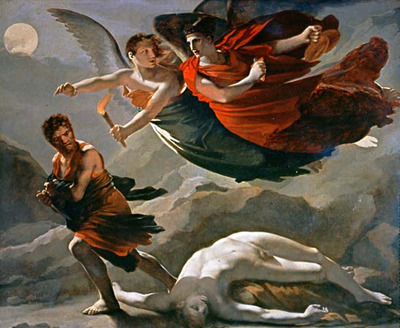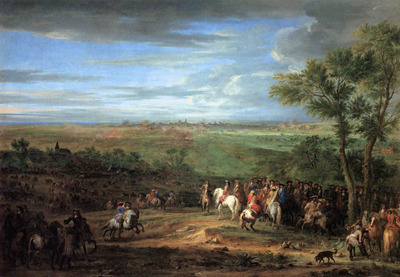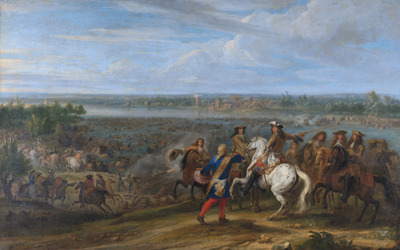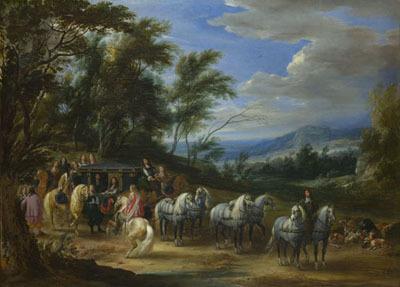Reading Proust's In Search of Lost Time in 2014 discussion

This topic is about
The Guermantes Way
The Guermantes Way
>
Week ending 06/07: The Guermantes Way, to page 540 / location 24126
date newest »
newest »
 newest »
newest »
message 1:
by
Renato
(last edited May 11, 2014 09:29AM)
(new)
-
rated it 5 stars
May 11, 2014 08:50AM
 Mod
Mod
reply
|
flag
 I'm not sure what it is about these passages, but I'm loving them. It's poetic and beautiful while still describing a sort of post-Christmas let-down.
I'm not sure what it is about these passages, but I'm loving them. It's poetic and beautiful while still describing a sort of post-Christmas let-down. "But a pair of lips, designed to convey to the palate the taste of whatever whets the appetite, must be content, without ever realising their mistake or admitting their disappointment, with roaming over the surface and with coming to a halt at the barrier of the impenetrable but irresistable cheek."
and then...
"But alas - for in this matter of kissing our nostrils and eyes are as ill placed as our lips are shaped - suddenly my eyes ceased to see; next my nose, crushed by the collision, no longer perceived any fragrance, and, without thereby gaining any clearer idea of the taste of the rose of my desire, I learned, from these unpleasant signs, that at last I was in the act of kissing Albertine's cheek."
Formerly, when the wind howled in my chimney, I would listen to the blows which it struck on the iron trap with as keen an emotion as if, like the famous bow-taps with which the C Minor Symphony opens, they had been the irresistible appeal of a mysterious destiny.
I had to stop my reading there, put on Beethoven's Symphony No. 5 in C Minor and re-start the chapter. :)
---
It was a little disappointing to me that he didn't talk more about his grandma's passing... I expected long essays about life and death!
Sunny, those passages you mentioned were so beautiful indeed! I really enjoyed him saying that our nostrils and eyes are ill placed because, when you're kissing someone, you can't see or smell properly anymore. Never thought of that, haha. It's like your sensations are dimmed down in a way...
While I was reading his descriptions of what the kiss would be and feel like, I was thinking to myself "if all of this is about a kiss on the cheeks, I'll be really disappointed!" Turned out it was, but instead it actually made me smile and I thought of it as something very romantic and innocent - even though he's only consumed by desire at this point, as he said. That's one of the funny aspects of reading something written so long ago: he was burning up for a kiss on the cheeks, haha!
---
Still on his talk to Albertine, she mentioned a duel in which he was involved? What???
While I was reading his descriptions of what the kiss would be and feel like, I was thinking to myself "if all of this is about a kiss on the cheeks, I'll be really disappointed!" Turned out it was, but instead it actually made me smile and I thought of it as something very romantic and innocent - even though he's only consumed by desire at this point, as he said. That's one of the funny aspects of reading something written so long ago: he was burning up for a kiss on the cheeks, haha!
---
Still on his talk to Albertine, she mentioned a duel in which he was involved? What???
Two other musical pieces were mentioned in this week's reading:
1) Adieu, by August Heinrich von Weyrauch - wrongly attributed to Schubert.
Here's a version I found on YouTube: https://www.youtube.com/watch?v=kog9m.... Such a beautiful and sad melody - it's stuck in my head since I first listened to it!
2) Richard Wagner's Tannhaäuser, The Pilgrim's Chorus:
http://www.youtube.com/watch?v=lBqwAG...
1) Adieu, by August Heinrich von Weyrauch - wrongly attributed to Schubert.
Here's a version I found on YouTube: https://www.youtube.com/watch?v=kog9m.... Such a beautiful and sad melody - it's stuck in my head since I first listened to it!
2) Richard Wagner's Tannhaäuser, The Pilgrim's Chorus:
http://www.youtube.com/watch?v=lBqwAG...
When Françoise walked into his bedroom with a lighted lamp while he was in bed with Albertine, the narrator mentioned this beautiful Prud'hon painting:

Justice and Divine Vengeance Pursuing Crime, Pierre-Paul Prud'hon
He also mentions Adam Frans van der Meulen:
Some of his paintings:




Justice and Divine Vengeance Pursuing Crime, Pierre-Paul Prud'hon
He also mentions Adam Frans van der Meulen:
Between the last festivity of summer and one's winter exile, one ranges anxiously that romantic world of chance encounters and lover's melancholy, and one would be no more surprised to learn that it was situated outside the mapped universe than if, at Versailles, looking down from the terrace, an observatory round which the clouds are massed against a blue sky in the manner of Van der Meulen, after having thus risen above the bounds of nature, one were informed that, there where nature begins again at the end of the great canal, the villages which one just could not make out, on a horizon as dazzling as the sea, were called Fleurus or Nimègue.
Some of his paintings:



A question for you all: would you consider our narrator... spoiled?
We've already discussed previously about how he really desires something and then immediately gets disappointed as soon as he gets fulfillment. Now, whilst he was sure Mme. de Stermaria was going to have dinner with him, he mentions how he would prefer that his night remained free of this commitment:
And then, when she cancels, he "began to sob"!
We've already discussed previously about how he really desires something and then immediately gets disappointed as soon as he gets fulfillment. Now, whilst he was sure Mme. de Stermaria was going to have dinner with him, he mentions how he would prefer that his night remained free of this commitment:
Also, it was no longer exactly Mme. de Stermaria that I should have wished most to see. Forced now to spend my evening with her, I should have preferred, as it was almost the last before the return of my parents that it should remain free and myself try instead to find some of the women from Rivebelle.
And then, when she cancels, he "began to sob"!
 Renato wrote: "Formerly, when the wind howled in my chimney, I would listen to the blows which it struck on the iron trap with as keen an emotion as if, like the famous bow-taps with which the C Minor Symphony op..."
Renato wrote: "Formerly, when the wind howled in my chimney, I would listen to the blows which it struck on the iron trap with as keen an emotion as if, like the famous bow-taps with which the C Minor Symphony op..."I too was surpised Renato that half a page after grandmother was declared dead we start a new section. A little more info is provided about her funeral before the volume ends, but his emphasis on memory leaves me wondering if her death and funeral will be explored more fully later through "flashback."
 Renato wrote: "A question for you all: would you consider our narrator... spoiled?
Renato wrote: "A question for you all: would you consider our narrator... spoiled?We've already discussed previously about how he really desires something and then immediately gets disappointed as soon as he ge..."
He seemed spoiled to me at the beginning of Swann's Way - an 11 year old boy who can't go to sleep until his mother comes upstairs to kiss him goodnight. But as I've read through the first three volumes I've come to think of him as naive. All these episodes of worshipful adulation for women young and old. Right up to Mme. Stermaria he is blindsided by disappointed and bursts into tears. I keep thinking this is about a loss of innocence, but is it the loss of the narrator's innocence or the loss of my own innocence as a reader I am observing?
 Renato wrote: "When Françoise walked into his bedroom with a lighted lamp while he was in bed with Albertine, the narrator mentioned this beautiful Prud'hon painting:
Renato wrote: "When Françoise walked into his bedroom with a lighted lamp while he was in bed with Albertine, the narrator mentioned this beautiful Prud'hon painting:Justice and Divine Vengeance Pursuing Crime..."
Thank you for the wonderful support on posting paintings and mentioning specific music Renato!
 I am finding that the further I get in these volumes the more I sense the presence of the "mature, reflective" narrator. At this point I'm estimating he is in his early twenties. He wears his emotions on his sleeve, and seems repeatedly naive in his relationships with women - but he is highly educated (something transparent in the novel, his education), socially sophisticated, and his commentary on human and world affairs reflects the experienced genius that wrote these books!
I am finding that the further I get in these volumes the more I sense the presence of the "mature, reflective" narrator. At this point I'm estimating he is in his early twenties. He wears his emotions on his sleeve, and seems repeatedly naive in his relationships with women - but he is highly educated (something transparent in the novel, his education), socially sophisticated, and his commentary on human and world affairs reflects the experienced genius that wrote these books!
Dave wrote: He seemed spoiled to me at the beginning of Swann's Way - an 11 year old boy who can't go to sleep until his mother comes upstairs to kiss him goodnight. But as I've read through the first three volumes I've come to think of him as naive. All these episodes of worshipful adulation for women young and old. Right up to Mme. Stermaria he is blindsided by disappointed and bursts into tears."
Yes, I thought he was spoiled back then as well. But I just let it be by thinking "he's an 11 year old boy... maybe he's too close to his mother etc.". But now, he's in his early twenties I guess, haha.
Also, I never thought of him as being naive. I'd say he's even malicious in a way as he decides he wants something and goes for it, but never to the point, he creates situations and even uses people, like his morning walks to see Mme. de Guermantes every day, his trip Doncières to convince Saint-Loup to talk him up to her etc.. Maybe we're getting lost in translation here, but I don't consider those attitudes of a naive person.
Dave wrote: "I keep thinking this is about a loss of innocence, but is it the loss of the narrator's innocence or the loss of my own innocence as a reader I am observing?"
I don't think I get what you mean... can you try to elaborate more as it seems like an interesting point?
Yes, I thought he was spoiled back then as well. But I just let it be by thinking "he's an 11 year old boy... maybe he's too close to his mother etc.". But now, he's in his early twenties I guess, haha.
Also, I never thought of him as being naive. I'd say he's even malicious in a way as he decides he wants something and goes for it, but never to the point, he creates situations and even uses people, like his morning walks to see Mme. de Guermantes every day, his trip Doncières to convince Saint-Loup to talk him up to her etc.. Maybe we're getting lost in translation here, but I don't consider those attitudes of a naive person.
Dave wrote: "I keep thinking this is about a loss of innocence, but is it the loss of the narrator's innocence or the loss of my own innocence as a reader I am observing?"
I don't think I get what you mean... can you try to elaborate more as it seems like an interesting point?
 On the naivety, I'm thinking specifically of his relations with women. Gilbert, Odette, Albertine, the Duchess, Mme. Stermaria - each in turn idolized, obsessed over, and then grows bored with (sometimes in psychological defense of being discarded by them). How many times does he need to repeat this emotionally infantile pattern to learn better and change? Well maybe, at 63, Iv'e simply forgotton the power of male hormones to decieve the brain.
On the naivety, I'm thinking specifically of his relations with women. Gilbert, Odette, Albertine, the Duchess, Mme. Stermaria - each in turn idolized, obsessed over, and then grows bored with (sometimes in psychological defense of being discarded by them). How many times does he need to repeat this emotionally infantile pattern to learn better and change? Well maybe, at 63, Iv'e simply forgotton the power of male hormones to decieve the brain.Regarding the other comment about my own loss of innocence. I've done some reading up on "new literary criticism" where there is encouragement to consider the "reader" and their relationship to the book as fair game for analysis (among other things). So in this approach, you step out of the reading experience and consider yourself reading as sort of an "out of body" experience. Every reader does this naturally I think, but not so formally. So my remark about innocence is along those lines - "is Proust writing a series of events to point to the narrator's loss of innocence as a child in the process of growing up or am I, as reader, experiencing a sense of loss of innocence (nostalgia) of who the narrator was when he was first introduced in bed at Combray?" Then you can get into interesting questions like "what was the author's intent?" Writing a story is an act of communication across time and space. What "ideas" did the author deliberately include? What ideas did the author "unconsciously" include? What ideas do I, as reader, 100 years later on a different continent and in a different language receive, both consciously and unconsciously receive and understand? Ultimately, these answers are unique to each reader. The greatest writers communicate great ideas that are shared parts of the hunan experience across time and space and connect with readers universally. But there is always small, unique ideas and emotions that belong to specifically to each reader. These are to be cherished. (Sorry, long answer, sometime I get carried away with my own BS, lol)
Sunny in Wonderland wrote: "Oh, lord! He's crying again. He's actually sobbing this time."
My favourite quote from this section came right at the end and was the sobbing part:
My favourite quote from this section came right at the end and was the sobbing part:
I began to sob. I shivered, not only because the room was cold, but because a distinct lowering of temperature...is brought about by a certain kind of tears which fall from our eyes, drop by drop, like a fine, penetrating, icy rain, and seem as though they will never cease to flow.Poor old narrator; Albertine is now interested in him, Mme de Guermantes is falling over herself to get him to go to her dinner but he's not interested in them any more, he wants Mme Stermaria. Will he ever be satisfied?
Renato wrote: "Still on his talk to Albertine, she mentioned a duel in which he was involved? What??? ..."
I know, I thought the same. When the f*** did that happen? Presumably it wasn't 'pistols at dawn' as he wouldn't have been able to get up before midday. :-)
I know, I thought the same. When the f*** did that happen? Presumably it wasn't 'pistols at dawn' as he wouldn't have been able to get up before midday. :-)
Dave wrote: "On the naivety, I'm thinking specifically of his relations with women. Gilbert, Odette, Albertine, the Duchess, Mme. Stermaria - each in turn idolized, obsessed over, and then grows bored with (so..."
Renato & Dave: I can't really add much to the naivety of the narrator, but I would say that, for me, he's emotionally like a child. Although he's intellectually astute, as soon as his emotions kick in he's like a five year old. He wants what the other kid has and as soon as he's got it he's not interested and throws a tantrum.
He analyses every facial tick and expression of people at a party and can discuss how these are interpreted by those involved but he can't understand that stalking someone does not actually endear him to them.
He loves his grandmother obsessively, but only really when he wants attention and affection. When she's no longer of use he's not really interested or concerned. Ditto with his friends.
Isn't he a sociopath? or something similar? Do I like him? No! Is he fascinating? Yes. I think it's the fact that he can come out with some amazingly refined, convoluted, perspicacious remark one minute and then make some astoundingly bad decision the next that makes it a fascinating read. Everyone has their blind spots, unfortunately.
Renato & Dave: I can't really add much to the naivety of the narrator, but I would say that, for me, he's emotionally like a child. Although he's intellectually astute, as soon as his emotions kick in he's like a five year old. He wants what the other kid has and as soon as he's got it he's not interested and throws a tantrum.
He analyses every facial tick and expression of people at a party and can discuss how these are interpreted by those involved but he can't understand that stalking someone does not actually endear him to them.
He loves his grandmother obsessively, but only really when he wants attention and affection. When she's no longer of use he's not really interested or concerned. Ditto with his friends.
Isn't he a sociopath? or something similar? Do I like him? No! Is he fascinating? Yes. I think it's the fact that he can come out with some amazingly refined, convoluted, perspicacious remark one minute and then make some astoundingly bad decision the next that makes it a fascinating read. Everyone has their blind spots, unfortunately.
Dave: OH, I get what you mean about his naivety towards women. I agree with you.
Regarding the comment about the loss of innocence, your answer was very interesting! Thanks for taking the time to write it. I specifically liked the questions you asked, like what was Proust's intent, what ideas did he deliberately include etc.. those are very interesting points to consider. Is there any book you would recommend about this "new literary criticism" you mentioned?
Regarding the comment about the loss of innocence, your answer was very interesting! Thanks for taking the time to write it. I specifically liked the questions you asked, like what was Proust's intent, what ideas did he deliberately include etc.. those are very interesting points to consider. Is there any book you would recommend about this "new literary criticism" you mentioned?
Jonathan wrote: "Poor old narrator; Albertine is now interested in him, Mme de Guermantes is falling over herself to get him to go to her dinner but he's not interested in them any more, he wants Mme Stermaria. Will he ever be satisfied?"
Haha, that sums it up perfectly. It seems though as Albertine will remain on his life for more time, so I'm curious to see how they'll relationship will evolve/change over the years.
Jonathan wrote: "Renato & Dave: I can't really add much to the naivety of the narrator, but I would say that, for me, he's emotionally like a child. Although he's intellectually astute, as soon as his emotions kick in he's like a five year old. He wants what the other kid has and as soon as he's got it he's not interested and throws a tantrum.
He analyses every facial tick and expression of people at a party and can discuss how these are interpreted by those involved but he can't understand that stalking someone does not actually endear him to them."
Yes, it's very interesting how blind he gets once he's feeling emotional towards something.
Another thing to consider here is that we have an older experienced narrator telling us what happened to his younger self (all of his actions, shameful as they were). His analises on facial expressions, gestures, words... his insights maybe sound like they came from his older self? Could that be it?
Haha, that sums it up perfectly. It seems though as Albertine will remain on his life for more time, so I'm curious to see how they'll relationship will evolve/change over the years.
Jonathan wrote: "Renato & Dave: I can't really add much to the naivety of the narrator, but I would say that, for me, he's emotionally like a child. Although he's intellectually astute, as soon as his emotions kick in he's like a five year old. He wants what the other kid has and as soon as he's got it he's not interested and throws a tantrum.
He analyses every facial tick and expression of people at a party and can discuss how these are interpreted by those involved but he can't understand that stalking someone does not actually endear him to them."
Yes, it's very interesting how blind he gets once he's feeling emotional towards something.
Another thing to consider here is that we have an older experienced narrator telling us what happened to his younger self (all of his actions, shameful as they were). His analises on facial expressions, gestures, words... his insights maybe sound like they came from his older self? Could that be it?
On Albertine:
...she seemed to me often to be a very poor sort of rose, and I would have preferred to shut my eyes to avoid seeing the various blemishes on its petals...
It is true that I was not in the least in love with Albertine...
 Somehow I missed something in this section and didn't take the time to find the answer. Saint Loup had written a letter (?) to the narrator recommending Mme Stermaria? I never went back to see what was said. From his thoughts and actions, the narrator seems to believe Mme Stermaria is what has been referred to in the US as a "sure thing.". That proves not to be the case. There seems to be a pattern developing of Saint Loup being "unreliable" in word and deed. Am I on the right track here?
Somehow I missed something in this section and didn't take the time to find the answer. Saint Loup had written a letter (?) to the narrator recommending Mme Stermaria? I never went back to see what was said. From his thoughts and actions, the narrator seems to believe Mme Stermaria is what has been referred to in the US as a "sure thing.". That proves not to be the case. There seems to be a pattern developing of Saint Loup being "unreliable" in word and deed. Am I on the right track here?



